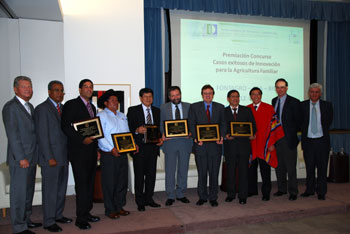“Organized smallholder farmers can be successful innovators” was the message of winners during an awards ceremony supported by these organizations.

Washington DC, May 2, 2013 (IICA). The Inter-American Institute for Cooperation on Agriculture (IICA) joined the Regional Fund for Agricultural Technology (FONTAGRO) and the Inter-American Development Bank (IDB), in awarding the winners of the contest Successful cases on Innovation for Family Agriculture.
The awards ceremony held at IDB’s headquarters was attended by members of FONTAGRO’s Board of Directors, IICA, IDB, and special guests from the industry, donors and other strategic partners. During the ceremony, members of the international community learned how smallholder farmers, processors and traders from Latin America and the Caribbean developed and promoted innovations that are changing lives and improving their livelihoods.
German Mejía Tuco, President of the Regional Association of Agricultural Producers of Cusco (ARPAC) in Peru, received the prize for the case Andean Culture and New Paradigms: the Huancaro Market.
This farmer leader explained how this market has provided major economic and social benefits for ARPAC’s 5,000 members, benefiting also more than 25,000 consumers who now have weekly access to fresh products grown locally. The market has been a model, and as a result the Peruvian government subsequently passed a law to implement similar markets in other regions of the country.
The National Institute of Agricultural Technology (INTA) of Argentina and the Center for Agricultural and Forestry Development (CEDAF) of Dominican Republic won the prize for the case A Collective Mode Innovate: Beekeeping in Argentina and Dominican Republic. This case documents technological innovations, good practices, organization and knowledge exchange between farmers and researchers of both countries.
This effort has resulted in Argentina becoming number one exporter of organic honey, displacing China in the global market.
The International Potato Center (CIP) project Innovation to value diversity of native Andean potatoes in Peru describes how CIP and its 23 public and private partners developed new highly sought after products from native potatoes. The effort has resulted in a 55% increase in native potatoes consumption due to the high demand for these new products, benefiting the small farmers in the Peruvian highlands.
The publication Innovations Impact: Lessons from family farms in Latin America and the Caribbean was also officially launched. Priscila Henríquez, IICA’s specialist in the management of technological innovation, indicated that this is a tribute to the inventive and hard work of thousands of small farmers, processors and marketers in the region.
“We see that organization is very important for the success of farmers in taking advantage of the market opportunities. Many of these innovations involve the hard work of the women”, pointed out Henríquez.
She reaffirmed IICA’s commitment to support FONTAGRO and indicated that this contest was an example of collaboration between IICA, FONTAGRO and IDB for the benefit of family farming.
During a roundtable conversation, the winners highlighted the major impacts and lessons learned from their experiences. “Innovation is not only about technology, but also about institutions and adequate policies to support the innovators over time”, expressed Willem Janssen, senior economist of the World Bank.
FONTAGRO is a mechanism for cooperation in Latin America and the Caribbean, created in 1998 by 15 countries in the region to promote innovation for the benefit of small farmers. IICA provides technical support to FONTAGRO in the development of initiatives like the contest to disseminate innovations and learn from their successes.
To date, FONTAGRO has implemented 73 projects in consortia with organizations from its member countries. Currently, FONTAGRO and its sponsors are developing more public-private strategic alliances for the benefit of agriculture in the region.
For more information, contact:
priscila.henriquez@iica.int











